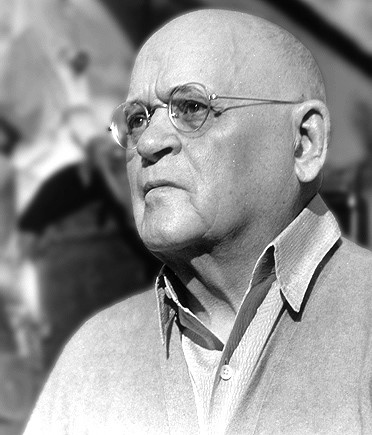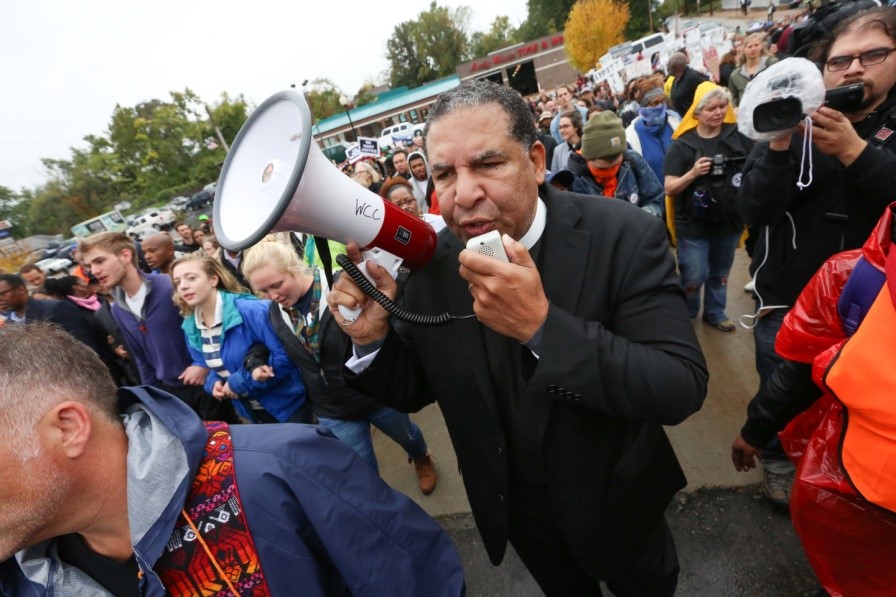Foundation Watch
The W.K. Kellogg Foundation’s Radical Leftward Drift
Have some liberal politics with your cereal!


Summary: One of America’s oldest philanthropic organizations, the W.K. Kellogg Foundation, was the brainchild of the famously apolitical cereal magnate. Founded almost a hundred years ago, the Kellogg Foundation has long since watered down its main mission—the welfare and medical care of children—with donations to trendy left-wing causes, including the racist polemicists of Black Lives Matters and other radical groups promoting open borders with Mexico.
If you apply the old Woodward and Bernstein adage “follow the money,” to the W.K. Kellogg Foundation, then there are few philanthropies whose unstated politics are more easily understood.
The W.K. Kellogg Foundation is currently the seventh-largest philanthropy in the U.S. in terms of dollars, according to a 2016 analysis of the foundation. In 2015, the last year for which its IRS filings are available, the foundation distributed nearly 2,000 grants totaling $268,065,253. It ended the year with $448,430,564 in assets. (This amount does not include the almost $9 billion in assets housed in the W.K. Kellogg Foundation Trust, which supplies most of the operating funds of the Kellogg Foundation.)
The cereal magnate W.K. Kellogg created the foundation because his grandson, despite the family’s enormous wealth, couldn’t get decent health care in small town Michigan where he lived. Kellogg quickly grasped the need for funding in underserved areas.
Since its founding, the Kellogg philanthropy has given hundreds of millions of dollars to hospitals, schools, and youth centers, especially in rural and underprivileged areas. But it has strayed from the goals of its conservative founder, thus betraying what is called “donor intent,” an important concept in the philanthropic community. In the last few years, the Kellogg Foundation has sent billions of dollars to left-wing causes like open-borders groups, liberal think tanks, and projects supported by billionaire leftist George Soros. (We previously profiled the Kellogg Foundation in the May 2013, February 2010, and April 2007 issues of Foundation Watch.)
Although it seems clear W.K. Kellogg himself would not approve of what his foundation has become, its leftward drift has been aided by the man’s inherent reticence: As philanthropy expert Martin Morse Wooster recently wrote, “Kellogg never expressed his ideas at length. He was a quiet, unassuming man, who would sit in the back row in ceremonies in his honor. When asked for an autobiography, he produced a 150-word statement.”
A Bit of History
Will Keith Kellogg was born April 7, 1860 in Battle Creek, Michigan, to John Preston Kellogg and his wife Ann Janette Stanley Kellogg under a lucky star: “I was my father’s seventh son, born on the seventh day of the week, on the seventh day of the month. My father was a seventh child and the name ‘Kellogg’ has seven letters,” W.K. Kellogg, something of a numerologist, later recalled.
“Kellogg was one of 14 children in a strict Seventh-day Adventist family,” adds his biography, in Philanthropy Roundtable’s Philanthropy Hall of Fame. “They observed the Sabbath on Saturday, and abstained entirely from alcohol, tobacco, coffee, tea, and meat. Schooling for W.K. (as he liked to be called) ended at age 13, when he was apprenticed to his father’s broom-making business. It was a childhood filled with work and responsibility. ‘As a boy,’ W.K. lamented, ‘I never learned to play.’”
Today, Battle Creek, a small city of 52,347 people about 120 miles west of Detroit, is still the headquarters of both the Kellogg’s Company and the foundation. Though the foundation still owns tens of millions of shares of Kellogg’s stock, according to Inside Philanthropy magazine, the company and the foundation, at least on paper, have remained separate entities.
In 1879, W.K. Kellogg got married to the beautiful Ella Osborn Davis. Soon after this, W.K.’s brother John Harvey Kellogg, a doctor, hired him to work at the Battle Creek Sanitarium, where the latter was superintendent. This job, remunerated with the princely sum of $6 per week, also included room and board. As described in a noted biography, Will Keith Kellogg: The Breakfast King, “…a testy relationship existed between the brothers that had its origins in childhood; John would occasionally whip his younger brother for real or perceived infractions.”
Seven years older than W.K., John Harvey is considered a genius or a quack, depending on who’s writing the opinion: “John, the author of more than fifty books, was a medical genius far ahead of his time,” says the biography, who introduced new surgical techniques, coined the term ‘sanitarium’ and pioneered the concept of healthy eating and regular exercise. “Battle Creek Sanitarium had only twelve patients when he joined as chief physician,” the biography continues. “He ordered the patients to eat natural food and refrain from smoking—he believed smoking caused cancer.” What would eventually become corn flakes was first dreamed up by John Harvey for his sanitarium patients. Though he also had his quirks: He became obsessed with masturbation; the breakfast flakes he created he believed would curb what he saw as an unhealthy and addictive practice, their bland taste a palliative to reduce sexual arousal.

The J.H. Kellogg Sanitarium
In his obsessions, right or wrong, John Harvey was following in a tradition of wholeness and health emphasized by the Seventh-day Adventist church from its creation in the 1860s. The church preached a vegetarian kosher diet, as prescribed in the Bible in Leviticus 11.
Among John Harvey’s patients was Charles William (C.W.) Post, who himself would go on to form his own successful cereal company.
When numerous former patients wanted to make the breakfast flakes a regular part of their diet after leaving the sanitarium W.K. and J.H. Kellogg together opened a small plant to produce the stuff. But unlike J.H., W.K. thought big: He envisioned a global brand powered by a global marketing campaign, while his brother only wanted his breakfast flakes available to former patients.
A battle of wills soon broke out between the two brothers; it became clear W.K. couldn’t implement his vision while still working for J.H. He quit the sanitarium in 1906 and incorporated the Battle Creek Toasted Corn Flake Company.
“W.K. took a third of the stock, “the biography explains, “and gave the rest to John in exchange for the rights to the cereals. John, parsimonious to a fault, paid sanitarium employees in stock in lieu of cash. W.K. surreptitiously purchased their shares and gained control.”
“Litigation between the two brothers ensued. John wanted to use the Kellogg name on his own food packaging but W.K. claimed the right to the Kellogg name…The breach between brothers was complete. They would only speak to each other when required at some annual family gathering.”
Meanwhile, W.K., who routinely worked 18 hours days, made his company a huge success, creating an entire breakfast food industry in the process.
The W.K. Kellogg Foundation
Now, on to philanthropy. The roots of W.K.’s philanthropic urges go back to 1913 when his grandson, a toddler named Kenneth Williamson, fell out of a second story window. Though the unfortunate tyke didn’t die, he was physically disabled the rest of his life.
Despite the vast wealth he had accrued, W.K. Kellogg could not find good health care for his grandson anywhere near Battle Creek. In a letter to a physician, Kellogg said the accident, “caused me to wonder what difficulties were in the paths of needy parents who seek help for their children when catastrophe strikes, and I resolved to lend what aid I could to such children.”
W.K. founded the Fellowship Corporation in 1923 and the W.K. Kellogg Foundation in 1930, with children’s health care, especially in the Battle Creek area, its main focus.
“A year after opening its doors, the Kellogg Foundation launched the Michigan Community Health Project,” his hall of fame biography notes. “Focused on the seven counties of southern Michigan, the 17-year initiative built new hospitals in rural areas, helped organize public health departments, and provided nurses and doctors for remote towns. In 1942, the State Department asked Kellogg to expand the program to Latin America as a wartime gesture of goodwill. Kellogg willingly complied.
“In doing so,” observes historian Joel Orosz, ‘the foundation curiously became international in scope before it became national.’”
The W.K Kellogg Foundation’s Fatal Flaw
When W.K. created his foundation, he stated that its purpose would be “…confined to receiving funds for the health, education, and welfare of mankind, but principally of children or youth, directly or indirectly, without regard to sex, race, creed, or nationality.”
Kellogg died on October 6, 1951, having been an active voice in the foundation and donating a total of $66 million—more than $1 billion in inflation-adjusted dollars—to the foundation over his lifetime.
While W.K.’s intent was to provide funds only for “health, education, and welfare of mankind,” the foundation experienced mission drift over time.
According to Martin Morse Wooster:
Since 1930 the mammoth W.K. Kellogg Foundation has given billions of dollars to causes and projects that encourage dependency on government. Founder W.K. Kellogg rejected socialism, but he was not specific about his intentions and not forceful about trying to fulfill them. As a result, the foundation Kellogg created has gone down the well-worn path of liberal philanthropy, donating to nonprofit advocacy groups that support government programs dealing with public health, agriculture, and the amelioration of poverty and it has little to show for all the money it has spent.
Today, against the understated but definite leanings of its capitalist founder, the foundation skews decidedly left. Its mission statement says the foundation “supports children, families and communities as they strengthen and create conditions that propel vulnerable children to achieve success as individuals and as contributors to the larger community and society.”
Grants are split into six categories: WKKF Community Leadership Network; Educated Kids; Healthy Kids; Secure Families; Racial Equity; Community & Civic Engagement. Plenty of funding finds its way to left-leaning groups focused on racial equality and community and civic engagement. For example, the American Civil Liberties Union (ACLU) received six grants totaling $1,297,079 between 2013 and 2015.
The National Association for the Advancement of Colored People (NAACP) also did well, receiving $2,095,000 from three grants in the same time period.
That’s not to say that grants to well-known left-wing nonprofits are rubber stamped: Planned Parenthood received a paltry $2,140 from Kellogg between 2014 and 2015.

W.K. Kellogg
The Good Part: Kellogg Gives Away Millions to Worthy Causes
The foundation continues to dole out tens of millions of dollars every year to hospitals, schools, and other charitable ventures.
The Boston Medical Center received $1,455,975 between 2013 and 2015 for a variety of child and infant programs. In 2015, the University of Nebraska Medical Center received $200,000; Health Connect One of Chicago, according to its website “the national leader in advancing respectful, community-based, peer-to-peer support for pregnancy, birth, breastfeeding and early parenting,” received $900,000.
The foundation gave two grants—totaling $348,001—to the Henry Ford Health System to “decrease the high infant mortality rate in at-risk populations by scaling an effective infant mortality reduction model and institutionalizing it to become sustainable, replicable, and reimbursable.”
The foundation also gives dozens of grants to schools, church based groups, the United Way (both to the national office and to myriad local chapters), the Humane Society, the Boy Scouts, and the Boys and Girls Club.
Charities serving Battle Creek, Detroit, and Kalamazoo are a regular recipient of funds. More than twelve grants in 2015 including: a $55,800 grant to the Battle Creek Catholic Schools, another $2,503,000 in grants to the Battle Creek Public Schools, and $1,911,332 to the Battle Creek Community Foundation, itself a nonprofit that funds local community programs.
“Since our founding in 1930, the W.K. Kellogg Foundation has been committed to ensuring that all children have the opportunity to thrive,” the WK Kellogg said in a statement to me. “In order to achieve this objective as a grantmaking organization, we seek to address the root causes of issues that adversely impact the lives of children, their families and their communities.”
Who Runs the W.K. Kellogg Foundation?
The current president and CEO, La June Montgomery, has held the post since 2015 after joining the foundation in 1987—so says her biography on the foundation’s website.
The board of trustees is a who’s who of power brokers throughout America’s heartland: Ramon Marguia is a noted attorney in Kansas City; Richard Tsoumas heads a wealth management group in Battle Creek; Cathan Kress is Iowa State University’s Vice President for Extension and Outreach; and Cynthia Milligan is a director with Wells Fargo and was the dean of the College of Business Administration at the University of Nebraska at Lincoln.
Several of the Foundation’s high-ranking employees show a distinct radical bent. One of them is the Rev. Alvin Herring, the Foundation’s Director of Racial Equality. In a December 2016 expose, Breitbart examined Herring’s social media postings and dug up the following RIP for a murderous socialist despot: “Rest in power #Fidel” Herring posted, to mark Fidel Castro’s death.
Herring has also penned a handful of posts for Sojourners, the eponymous magazine of a far-left group funded by the Open Society Institute.

Rev. Alvin Herring
In a Sojourners article, Herring cheered on the race rioters who brought Ferguson, Missouri, to its knees after the fatal police shooting of Michael Brown in August 2014. His tone recalled that of radical 1960s lawyer William Kuntsler who denounced police as “an occupying army” in the inner cities.
“Last night democracy was trampled not as the media would suggest by the angry footfalls of sullen youth determined to disturb the peace and wreak havoc in their own community, but by the heavy march of a police force that seemed determined to create tension and antagonize young people—young people who are carrying the trauma of nights of unrest and lifetimes of dehumanizing racism,” Herring wrote in his breathy, demagogic prose.
“Law enforcement was outfitted with the machinery of war. The officers wore military fatigues and carried automatic weapons. They were helmeted, with their faces obscured, and in the darkness, they looked more like machines than human beings. They perched atop huge military vehicles with glaring lights and screeching sirens. It was otherworldly—and all of this to face down a group of wounded children, wounded tonight and many nights before this night.”
Open Borders
Unfortunately, Herring oversees grants related to keeping the U.S.-Mexico border wide open for illegal aliens and terrorists.
Under his leadership, the foundation gave $2,400,000 to the far-left racists of the National Council for La Raza for “general operating support” in 2015. A significant jump in Kellogg’s support for this organization: the foundation gave nothing to La Raza in 2014 and only $45,000 for a charitable “annual conference luncheon lecture”—a far-left speaker talking to a thousand or more La Raza members at its annual conference—in 2013.
The foundation maintains an office in Albuquerque, New Mexico and has doled out millions of dollars in grants to open-borders groups. One of them, El Centro De Igualdad y Derechos (The Center for Equality and Rights) is a “grassroots, Latino immigrant led organization based in Central New Mexico that works with Latino immigrant communities and allies to defend, strengthen, and advance the rights of our community,” according to its website.
The $125,000 grant El Centro received goes to “increase family stability for mixed status (presumably to both legal and illegal aliens) immigrant children by increasing the number of families who can start down a path to citizenship” (italics mine).
Another Albuquerque area open-borders group name La Plaza De Encuentro (The Meeting Place) received two grants from Kellogg totaling $400,000 in 2015. According to a story in Alibi, an alternative magazine in Albuquerque, the two groups worked together against SB 1070.
La Plaza De Encuentro’s “mission is to transform New Mexico into a thriving community for all of its residents. We do this by engaging Latino immigrant families in educational opportunities that build skills for economic and social justice.” But the group’s office was a staging area for pro-illegal alien demonstrations on May Day in 2010, and agitated vigorously against the tough immigration bill known as Arizona SB 1070.
“In Albuquerque, El Centro de Igualdad y Derechos hosted a Day of Action that incorporated a vigil, concert and party,” the report stated. “Though the event was fun and family-friendly, says community organizer Adonai Morales, it was also meant to make a stand against Arizona’s new law. ‘We wanted to gather support for comprehensive immigration reform,’ he says. Hundreds attended, including Albuquerque City Councilor Rey Garden.
“El Centro held the event at Plaza de Encuentro in Barela, where the organization will launch an immigrant center in June. El Centro will expand its services in fighting for immigrant rights…as well as offer courses on English, computer literacy, business development and parenting. The Barela’s location (714 Fourth Street SW) is ideal, he says, and will serve as a bridge between immigrants and local Chicanos.”
The Latin American Youth Center in Washington D.C., which received a Kellogg grant of $25,000 in 2015, has previously advocated for DACA (Deferred Action for Childhood Arrivals), a controversial amnesty program. The group was featured in a Washington Post story on the supposedly harmful psychological effects of being an illegal alien.
Other open-borders groups received grants. National Hispanic Media Coalition, which received $204,000 for two grants in 2013 and George Soros’s National Immigration Forum. The foundation also gave a grant to the Migration Policy Institute (MPI) to “improve immigrant and refugee workers’ credentials in the early age and education field through concerted national and state based initiatives and advocacy efforts.”
The Ubiquitous George Soros
The foundation and interests of left-wing mega-donor George Soros frequently overlap. Soros is the hedge fund manager who believed that George W. Bush won in 2000 because Republicans had superior think tanks which dominated the media. He wanted to create a network of think tanks to challenge them.
According to a December 2016 Breitbart profile of the foundation, it gave $200,000 between 2010 and 2012 to Soros’s Open Society Institute, which certainly didn’t need the money. It has also given a staggering $40 million-plus to the shadowy far-left Tides Foundation since 2008.
In most cases the parameters of the grant are nebulous like this one highlighted in the Breitbart piece: “Provide updated publications/tools describing the state of grantmaking with a racial equity/racial justice lens, including insights to support grantmaking considerations at the program officer and institutional levels, through support of the Philanthropic Initiative for Racial Equity.”
Another Breitbart article by Aaron Klein revealed the foundation gave at least $930,000 to an arm of the violent, racist Black Lives Matter movement. Black Lives Matter, by the way, has come a long way. In 2016, it announced it was partnering with something called the International Development Exchange (IDEX), which claims to provide “incubation services and global learning opportunities for the movement for Black lives.”
In a press release IDEX, a 501(c)(3) nonprofit that offers fiscal sponsorship services, and the “Black Lives Matter Global Network” announced their strategic partnership. The two groups “will support one another with the goals of promoting social change within marginalized communities.” IDEX describes itself as “a 30-year-old international grantmaking organization” that “provides fiduciary oversight, financial management, and other administrative services to BLM.”
Meanwhile, the Center for American Progress (CAP)—the left-wing think tank started by Clinton loyalists John Podesta and Harold Ickes—has taken in more than $5 million from Kellogg since 2013. “It’s not completely wrong to see it as a shadow government, a kind of Clinton White-House-in-exile—or a White House staff in readiness for President Hillary Clinton,” according to a Nation article written before the 2016 presidential race.
Left-Wing Think Tanks
Another left-wing think tank cited by Breitbart as a Kellogg benefactor was the Center for Equitable Growth which has received $395,625 from them since 2016.
According to a 2014 email dug up by Breitbart, John Podesta, also listed as a founder of this think tank, was trying to create a wall of secrecy between the two groups: “While we believe there is much to be gained from our affiliation with CAP, we also believe that for us to be successful—and to do the most to support the work of CAP and other progressive organizations—requires that CAP’s support ‘leaves no fingerprints.’ (Please burn this email after you read it!)”
Among the other left-wing think tanks to accept Kellogg grants in recent years are Demos ($3.3 million) and the Center for Social Inclusion ($1,789,815).
The Center for Social Inclusion was founded in 2002, by two obdurate lefties, Maya Wiley and Jocelyn Sargent, with a $75,000 grant from the Tides Foundation and the Open Society Institute. Wiley, the daughter of George Wiley, a notorious figure in the community organizing world started the National Welfare Rights Organization (NWRO), the parent organization of the now-defunct ACORN. George Wiley was an early mentor to ACORN founder Wade Rathke—see our profile of Rathke entitled, “Wade Rathke Shakes Down the Whole World.” (Organization Trends, October 2013)

Maya Wiley
Sargent has deep ties to the Kellogg Foundation: “Prior to coming to the Hogg Foundation,” her biography says, “Jocelyn was a Program Director and Program Officer at the W.K. Kellogg Foundation. She designed and led grantmaking programs targeting the elimination of racial disparities and improving conditions for marginalized communities and served on the Racial Equity; Food, Health & Well Being; Education and Learning and Evaluation teams.”
The Center for Law and Social Policy (CLASP), which has taken in $698,086 from Kellogg, calls itself non-partisan and boasts of being an “anti-poverty nonprofit advancing policy solutions for low-income people. Working at the federal, state, and local levels, we develop practical yet visionary strategies for reducing poverty, promoting economic security, and addressing barriers faced by people of color.”
Ralph Nader’s Public Citizen, has taken in $125,000 from Kellogg since 2013.
Needless to say, the supposedly non-partisan Kellogg Foundation gives a teensie fraction of its grant monies to conservative think tanks: In 2015, the foundation did not give grants to the Heritage Foundation, Cato Institute, the Hoover Institution, or the Competitive Enterprise Institute.; while the American Enterprise Institute got a meager $127,773. State Policy Network, the National Center for Policy Analysis, along with CEI, also received no grants in 2015.
Conclusion
The W.K. Kellogg Foundation was established to improve the lives of children, but like so many well-endowed philanthropies over time it betrayed the beliefs of its founder as it drifted steadily leftward.
It supports trendy, left-wing causes that contend America is a hopelessly racist country, along with groups that wage war on the free markets that the great capitalist Kellogg championed while alive. Kellogg would naturally approve of the foundation’s modern-day funding of hospitals, community centers, and children’s welfare organizations. But he never used his foundation to promote his politics which were apparently right of center for his times.
According to Martin Morse Wooster, Kellogg complained about the “Socialist trend” in politics, and “could not possibly have foreseen the way his organization would be used after his death to combat “white privilege,” or assist groups like “La Raza.”
“The direction he gave to guide future trustees was to ‘use the money as you please so long as it promotes the health, happiness and well-being of children.’”
Unfortunately, when big money is involved, vague directions about how to spend it aren’t enough.
After spending a decade in finance, Michael Volpe has been a freelance investigative journalist since 2009. His work has been published locally in the Chicago Reader, Chicago Crusader, Chicago Heights Patch, and New City. Nationally, Volpe’s work has appeared in a wide variety of publications including the Washington Examiner, the Daily Caller, Crime Magazine, the Southern Christian Leadership Conference Newsletter, and Counter Punch. His most recent book, Sandra Grazzini Rucki and the World’s Last Custody Trial, was released in October 2016.



